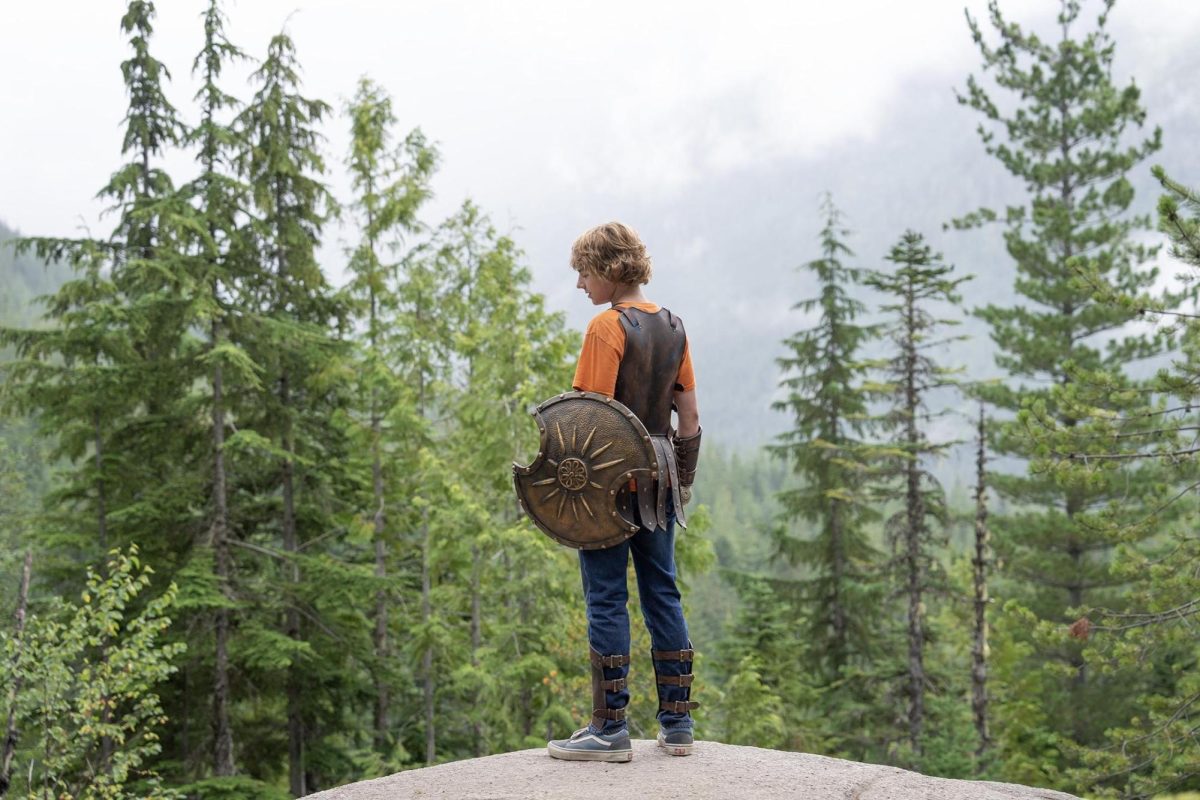I met up with hometown friends over winter break to watch the premiere of “Percy Jackson and the Olympians,” the same peers I had spent middle school rehashing its source material with on countless occasions. Watching the tweenage heroes of our youth make the jump from page to screen was an anchor back to our pasts — the Disney+ series made us feel old, but we were undoubtedly its target audience.
The series follows Percy Jackson (Walker Scobell), whose adolescence has been characterized by school expulsions and visions of mythological creatures. These visions become concrete when he finds out his father is the sea god Poseidon, and because of this, his life is in imminent danger. Percy finds refuge at Camp Half-Blood, a space where demigods — the half-mortal children of ancient Greek deities — learn to defend themselves from the ever-prominent threats of the gods and monsters who want them dead. With the help of Annabeth (Leah Sava Jeffries), a daughter of Athena, and his satyr protector, Grover (Aryan Simhadri), Percy embarks on a quest to recover Zeus’ stolen lighting bolt, the loss of which would result in a war of mythic proportions.
Based on the best-selling books from author Rick Riordan, this is not the series’ first swing at an adaptation. A 2010 film based on “The Lightning Thief” was released to relative commercial success, but received disapproval from fans and Riordan alike.
“Even the most powerful authors … have WAY less influence and control than you think they do,” said Riordan in a 2018 statement. “Nobody talks about that though, because when a movie is just coming out it is in the studio’s interest for it to SOUND like everybody was very involved and pleased with the final product.”
Riordan serves as co-creator and executive producer for the Disney+ series. Despite Riordan’s qualms around the films’ divergences from source material, the show treads the line between familiarity and novelty; the television format allows for perspectives beyond Percy’s to be explored, shedding light on his mother’s relationship with Poseidon, for instance, through the inclusion of new scenes that don’t exist in the books.
Percy’s journey not only thematically mimics the heroic epics of Greek mythology, but also takes form as a coming-of-age saga. Visually, the lofty expectations placed on the demigods’ shoulders are communicated through their wardrobes and mannerisms, provoking empathy in audiences. Percy and his fellow campers appear strikingly young on screen — Scobell and Jeffries were both under 15 during filming — contrasting their quest fighting gods and monsters.
Scobell assumes the role of protagonist with all of Percy’s unflinching loyalty and sarcasm, while Jeffries carries enough wisdom in her stance to imply her godly heritage in any given scene. Simhadri stands out as Grover, assuming an earnest wit that puts him on par with Percy’s humor.
While the demigods strike audiences with their humanity in the face of otherworldly crises, each Olympian casting was honorable in their personification of inhuman concepts. The god of war, Ares (Adam Copeland) embodies a balance between bloodthirsty cynicism and mania, making his presence as an antagonist both a looming threat and a source of comedic reprieve. The late Lance Reddick plays the imposing Zeus with all the strength and impersonality expected of the godly king. The gods’ presence across the series is sparse, allowing them to maintain an air of mystique above the plot, puppeteers against the backdrop of their children’s tribulations. Their presentation works with the protagonists’ youth to emphasize the unreasonable burden placed upon the demigods by their parents.
“Fitting’s not easy for guys like us, am I right? Our parents make it so hard,” adult demigod Procrustes tells Percy in Episode 7. “Stretching us and twisting us and hacking off pieces to make us seem more like them.”
As this monologue implies, Procrustes is known in myth to torture victims by stretching them to fit an iron bed. The trio’s encounter with the villain is brief: Percy immediately identifies him, working with Annabeth to defeat him. The trio often come face-to-face with similar threats in unassuming environments. Monstrous encounters across the series were often anticlimactic — quick realization followed by immediate resolution.
A pivotal difference between the show and book is the higher degree of knowledge that Percy possesses around the world of mythology. Unlike a book which can easily communicate the internal monologue of a character, TV adaptations need to imply these thoughts and feelings more subtly. While it felt more logical for Percy to have this background knowledge, the books’ tension predominantly comes from the heroes stumbling into monsters’ clutches, the details of their identities looming ominously in clues throughout the text before dawning on them in a moment of horror and realization. Even if readers themselves were aware of the presence of Medusa or the Lotus Eaters, much of the story’s fun was in anticipating the moment Percy realized their proximity, too, and began to strategize accordingly. While in some instances this allowed for depth — Medusa’s plotline appropriately expounded upon her role as a victim as well as a villain — the absence of the characters’ naivete left the series needing to find its tension elsewhere.
Likewise, some of the problem-solving in “Percy Jackson and the Olympians” felt dogmatic and overly reliant on a willingness to accept impending events from the books. The necessity of sending Percy on a quest at all was given little justification given his recent realizations around his identity, and an out-of-place observation from Luke in Episode 6 that a bickering Percy and Annabeth had “[turned] into an old married couple” felt like a premature hint at their later romantic involvement meant to satiate fans. Across eight episodes, the innocence of Riordan’s first book is sometimes sacrificed to propel the story forward.
Still, this did allow the series to be packed with references for pre-existing fans while dutifully providing exposition for newcomers, leaving it a promising introduction to Percy’s reincarnated world. An author-endorsed, well-funded adaptation is an ambitious fever dream for many a fandom, and the recent renewal of “Percy Jackson and the Olympians” for a second season will invite viewers to mature further alongside the universe’s characters in the years ahead.
Contact Eleanor Jacobs at [email protected].
























































































































































